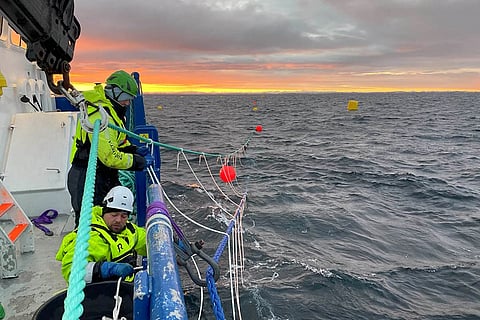

Operators deploy kelp lines at JIP Seaweed Carbon Solutions offshore test site in Norway.
Photo: SINTEF.
A new experimental seaweed farm, JIP Seaweed Carbon Solutions, has been established off the coast of Trøndelag, Norway, focusing on large-scale kelp cultivation as a potential solution for carbon capture and storage.
The project, initiated last year by Norway's SINTEF, maritime industry specialist DNV and other industry partners, has recently deployed its seaweed seedlings after obtaining a cultivation license.
The project involves a collaboration between researchers and industry players like SINTEF, DNV, Equinor, Aker BP, Wintershall Dea, and Ocean Rainforest, with a budget of NOK 50 million.
The goal is to develop a verified methodology for carbon capture and storage using seaweed, specifically targeting the transformation of seaweed into biochar for soil improvement.
The licensed aquaculture site, near the island of Frøya at Storflua in Frohavet, covers 200 decares and has the capacity for 55,000 meters of kelp lines, equipped for testing innovative aquaculture technologies.
The project partners expect the first seaweed to be harvested during the summer of 2024, with an estimated yield of 150 tons, potentially capturing 15 tons of CO2.
This initial phase of the project focuses on proof of concept and the development of cultivation and storage technologies, with plans for future upscaling.
“DNV’s research shows that in addition to a dramatic acceleration of renewable energy, carbon capture and removal technologies are essential to reach Net Zero, and seaweed biochar can potentially be one of these, says Ellen Skarsgård, Head of Sustainability Development and Climate at DNV.
“In this project, DNV will contribute towards developing a verified methodology for carbon capture and storage with seaweed, considering both the CO₂ removal potential and other environmental impacts and benefits.”
The JIP Seaweed Carbon Solutions project operates as part of the Norwegian Seaweed Centre, which is financed by the Norwegian Research Council.
